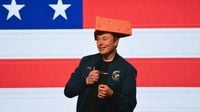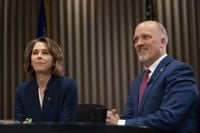Wisconsin is witnessing an unprecedented surge in campaign spending as the state prepares for a pivotal Supreme Court election on April 1, 2025. With over $80 million already funneled into the race, the contest between conservative candidate Brad Schimel and liberal candidate Susan Crawford has shattered previous spending records for judicial elections.
The dramatic increase in financial backing stems from the 2015 legislation that allowed unlimited spending in state elections, a move that former state Senator Robert Cowles has since criticized. "I just thought big money was an evil, a curse on our politics," Cowles remarked, reflecting on the consequences of that decision as voters are bombarded with attack ads from special interest groups.
As of March 25, 2025, political observers anticipate that spending could reach $100 million by Election Day, marking a significant escalation in the influence of money in Wisconsin's political landscape. Jay Heck, executive director of Common Cause Wisconsin, expressed widespread disgust across the political spectrum regarding the sheer volume of spending in what is traditionally a low-profile spring election.
The stakes are high in this election, with control of the seven-member court hanging in the balance. The court's ideological makeup could shift dramatically depending on the outcome, especially following the liberal majority's recent decisions to strike down gerrymandered legislative maps and reinstate absentee ballot drop boxes. A win for Schimel could reverse these critical rulings and influence crucial issues like abortion access in the state.
Elon Musk has emerged as a major player in this election, pouring millions into Schimel's campaign and even hosting a town hall event in Green Bay on March 30, 2025, where he presented $2 million in checks to two voters who signed his petition against "activist judges." Musk's involvement has sparked controversy, particularly due to legal challenges regarding the legality of his financial incentives. Wisconsin Attorney General Josh Kaul attempted to halt Musk's giveaway, arguing that it violates state laws against offering anything of value in exchange for votes. However, the state Supreme Court declined to hear the case, allowing Musk to proceed with his plans.
Musk's America PAC has reportedly spent around $20 million supporting Schimel, with additional funds coming from political organizations linked to him. His financial influence has raised eyebrows, prompting concerns about the implications of such substantial donations on judicial impartiality. Critics, including Crawford's campaign, have accused Schimel of being beholden to his wealthy donors.
The election is not just a battle for a judicial seat but a reflection of broader political tensions in the state. With endorsements from prominent figures like former President Donald Trump, who urged his supporters to back Schimel, the race has become a focal point for both state and national political narratives. Trump's social media posts have painted Crawford as a "disaster" and called for Wisconsin voters to rally behind Schimel, further intensifying the stakes.
As the election date approaches, many observers are questioning whether Wisconsin has reached a tipping point regarding campaign finance reform. Activists are beginning to organize and advocate for changes that could impose greater transparency and accountability on campaign spending. Some are looking to replicate successful measures from other states, such as Arizona and Oregon, which have implemented stricter disclosure requirements for campaign contributions.
Despite the growing calls for reform, Republican leaders have largely defended the current system, attributing the high levels of spending to the Supreme Court's 2010 Citizens United decision, which equated campaign spending with free speech. Ken Brown, a past chair of the GOP Party of Racine, emphasized the importance of free speech in political discourse, arguing against any limitations on campaign contributions.
As Wisconsin voters prepare to cast their ballots, the implications of this election extend beyond the immediate outcomes. Political experts are closely monitoring the situation, with many viewing the race as a potential indicator of voter sentiment leading up to the midterm elections. Professor Mordecai Lee from the University of Wisconsin-Milwaukee noted that the results could provide valuable insights into how voters respond to aggressive campaign tactics and financial incentives.
On the ground in Green Bay, the atmosphere surrounding Musk's town hall event was charged, with around 2,000 supporters in attendance, as well as hundreds of protesters outside the venue. The protesters, holding signs that read "WI NOT FOR SALE," voiced their concerns about Musk's influence in the election and the implications of such spending on democracy.
As the clock ticks down to Election Day, Wisconsin stands at a crossroads, with the outcome of the Supreme Court election potentially shaping the state's political landscape for years to come. With money playing an unprecedented role in this election, many are left wondering whether the voters will reclaim their voice or if the influence of billionaires like Musk will continue to dominate Wisconsin politics.







